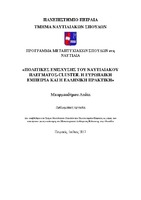Πολιτικές ενίσχυσης του ναυτιλιακού πλέγματος - cluster. Η ευρωπαϊκή εμπειρία και η ελληνική πρακτική

Προβολή/
Λέξεις κλειδιά
Ανταγωνιστικότητα ; Ναυτιλιακό cluster ; Γεωγραφική συγκέντρωση ; Καινοτομία ; Παγκοσμιοποίηση ; Competitiveness ; Maritime cluster ; Geographical concentration ; Innovation ; GlobalizationΠερίληψη
Η παρούσα εργασία με θέμα «Πολιτικές ενίσχυσης του ναυτιλιακού πλέγματος –
cluster. Η Ευρωπαϊκή εμπειρία και η Ελληνική πρακτική» έχει ως στόχο τη μελέτη του
ναυτιλιακού πλέγματος και την κατανόηση της συμβολής του στην οικονομία της χώρας.
Αρχικά, θα μελετήσουμε τη θεωρία των cluster με βάση τη διεθνή βιβλιογραφία. Θα
επικεντρωθούμε κυρίως στην θεωρία του M. Porter σχετικά με το πλέγμα και στην ανάλυση
του «διαμάντι του M. Porter». Έπειτα θα αναλύσουμε τα χαρακτηριστικά που παρουσίαζουν
τα πλέγματα, καθώς και τα είδη τους. Στη συνέχεια της θεωρίας θα αναφερθούμε στον κύκλο
ζωής του ναυτιλιακού πλέγματος, δίνοντας έπειτα παραδείγματα από παγκόσμια cluster.
Στο επόμενο κεφάλαιο θα περάσουμε στην ανάλυση του ναυτιλιακού πλέγματος,
εστιάζοντας στα χαρακτηριστικά και στις πολιτικές ανάπτυξης των ναυτιλιακών πλεγμάτων.
Σημαντικό ρόλο στη λειτουργία του ναυτιλιακού πλέγματος παίζουν οι σχέσεις συνεργασίας
μεταξύ των διαφόρων κλάδων του ναυτιλιακού πλέγματος, για παράδειγμα τα λιμάνια με τις
λιμενικές υπηρεσίες, η ναυτιλία με τα logistics και τις μεταφορές. Τέλος θα αναλύσουμε τις
επιδράσεις στους συμμετέχοντες στο cluster από τη δημιουργία και την ένταξη τους στο
cluster.
Έπειτα, θα ασχοληθούμε με τη Ευρωπαϊκή εμπειρία αναλύοντας τα ευρωπαϊκά
ναυτιλιακά cluster και συγκεκριμένα τις περιπτώσεις της Ολλανδίας, της Δανίας, της
Νορβηγίας και της Γαλλίας. Μέσω της ανάλυσης αυτής θα επικεντρωθούμε στις πολιτικές που
ακολουθούν τα επιτυχημένα αυτά cluster και τα οφέλη τους στην οικονομία της αντίστοιχης
χώρας.
Τέλος, στην εργασία αυτή θα αναλυθεί η Ελληνική πρακτίκη, οι προσπάθειες για την
δημιουργία ελληνικού cluster και οι κινήσεις των φορέων προς αυτή την κατεύθυνση.
Εστιάζοντας σε ένα αναπτυσσόμενο κλάδο του ναυτιλιακού cluster, το θαλάσσιο τουρισμό –
yachting θέτουμε ως στόχο την μελέτη των προοπτικών στο τομέα αυτό, ο οποίος έχει να
προσφέρει πολλά οφέλη στην ελληνική οικονομία.


